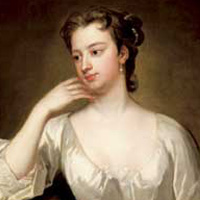Town Eclogues: Saturday; The Small-Pox by Lady Mary Wortley Montagu: Summary and Analysis
Town Eclogues: Saturday; The Small-Pox is a mock eclogue by Lady Mary Wortley Montagu. Eclogues are poems on pastoral subjects in a classical style, but the town eclogues are mock eclogues which parodies the original meaning of the eclogues and presents a newer version for the city dwellers. Montagu compares the beautiful people of London Court's society with the innocent people of pastoral lands.

Lady Mary W. Montagu (1689-1762)
Saturday is the last series of the poem collections in Town Eclogues and as per the tradition it has to close the poem series by lamenting on someone’s death. But in this poem, the speaker is not lamenting on the death of someone else, but about the loss of her own beauty damaged by smallpox. She has lost the love, flattery and flirtations, and she was no more a famous personality in the city. No one would talk about her, but condemn her and her ugliness. She feels that she has no right to live and life has no meaning in living without beauty and its worshippers.
This poem is a satire against the physicians, medical experts and against the patriarchy. To carry out this satire, Montagu writes the poem from the perspective of Belinda aka Flavia, who has lost her beauty because of smallpox. After the loss of her beauty, the speaker goes to take shelter in the pastures, saying farewell to the city life. In the city, she would be mocked or ridiculed for not being beautiful. She gets peace of mind and soul in the nature.
This eclogue is in the revised form. In the traditional eclogues, the characters themselves are the shepherds. As the monologue shows the speaker is not the shepherd, but a beautiful woman of the city who had become the pain the neck to the townsman. By revising the form, the poet is trying to use satire against patriarchy when Flavia is beautiful, all the people run after her as shown in the Rape of the Lock. She becomes the object of mockery and ridicule when she loses the beauty, and she can’t stay there in the city. In both conditions, women can’t remain in society. Therefore, they are compelled to choose the pasture at the end of their life.
